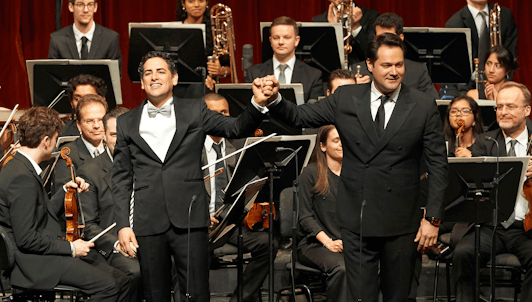The Liceu last performed the opera 32 years ago. This production celebrates the 200th anniversary of the French Romantic composer's birth. Albanian tenor Saimir Pirgu and Russian Operalia laureate Aida Garifullina mesmerize as the tragic lovers.
"All the young girls they want to be Juliette because they understand this image of this girl, " Aida Garifullina says. "She is soft. She is fragile". The aria Je veux vivre (I want to live), is an allegory, Aida Garifullina adds. "It shows that she really wants to live this adult life, to be free, to do what she wants, just to celebrate". "There is something really naïve in this aria," Saimir Pirgu says. "It's very beautiful to hear".
Magical duets, spinning waltzes and dramatic choruses combine to create an epic backdrop to this masterpiece.
"The musical idiom that Gounod uses ranges from the serious, to opera comique, to almost kind of chanson," says stage director Stephen Lawless. "Gounod also writes with a sense of very, for me, very French irony and elegance". Co-produced with the Santa Fe Opera in the United States, Lawless' sets place the drama during the American Civil War. "It’s 19th-century music. So we made the decision to set it in the 19th century but we wanted to find a context for it," Lawless explains.
Gounod infuses the drama with ravishing melodies, all while focusing on the two lovers. He ends by giving them a heart-wrenching final reunion in the tomb scene. "Sometimes when I'm singing that scene, it's quite emotionally hard for me, especially when I'm saying 'the last baiser, the last kiss'," Saimir Pirgu says. Roméo and Juliette's love triumphs as they die together in an immortal embrace. "It's so strong; heartbreaking," says Aida Garifullina. "She is adult enough to understand that the life is not only flowers, it can be really hard and difficult".
"In the real Shakespeare this last scene doesn't exist," Saimir Pirgu explains, "but in the Gounod story, it gave this opera a big power".
